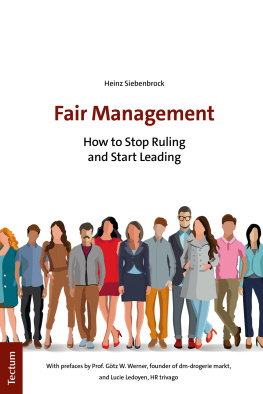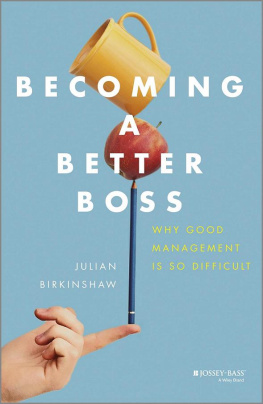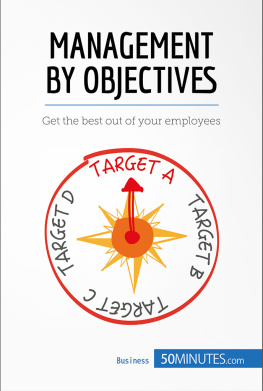
Heinz Siebenbrock
Fair Management
Heinz Siebenbrock
Fair Management
How to Stop Ruling
and Start Leading
Translated from German
by Tim Titchener
Tectum Verlag
Die Deutsche Nationalbibliothek verzeichnet diese Publikation in der Deutschen Nationalbibliografie; detaillierte bibliografische Daten sind im Internet ber http://dnb.d-nb.de abrufbar.
The Deutsche Nationalbibliothek lists this publication in the Deutsche Nationalbibliografie; detailed bibliographic data are available on the Internet at http://dnb.d-nb.de
ISBN 978-3-8288-4565-7 (Print)
978-3-8288-7620-0 (ePDF)
978-3-8288-7621-7 (ePub)
British Library Cataloguing-in-Publication Data
A catalogue record for this book is available from the British Library.
ISBN 978-3-8288-4565-7 (Print)
978-3-8288-7620-0 (ePDF)
978-3-8288-7621-7 (ePub)
Library of Congress Cataloging-in-Publication Data
Heinz Siebenbrock
Fair Management
How to Stop Ruling and Start Leading
Translated from German by Tim Titchener
374 pp.
Includes bibliographic references.
ISBN 978-3-8288-4565-7 (Print)
978-3-8288-7620-0 (ePDF)
978-3-8288-7621-7 (ePub)
Umschlaggestaltung: Tectum Verlag, unter Verwendung des Bildes # 740130493 von 300 librarians | www.shutterstock.com
Cover design: Tectum Verlag, using illustration # 740130493 by 300 librarians | www.shutterstock.com
1. Auflage 2021
Nomos Verlagsgesellschaft, Baden-Baden 2021
Alle Rechte, auch die des Nachdrucks von Auszgen, der fotomechanischen Wiedergabe und der bersetzung, vorbehalten.
This work is subject to copyright. All rights reserved. No part of this publication may be reproduced ortransmitted in any form or by any means, electronic or mechanical, including photocopying, recording, orany information storage or retrieval system, without prior permission in writing from the publishers.Under 54 of the German Copyright Law where copies are made for other than private use a fee is payableto Verwertungsgesellschaft Wort, Munich.
No responsibility for loss caused to any individual or organization acting on or refraining from action as aresult of the material in this publication can be accepted by Nomos or the author.
Foreword to the English edition
Your goal as a lead should be to become redundant, in fact to build such a strong team that they dont even need you anymore. You will tell me: isnt it a bit extreme to associate leadership with redundancy? How can a leader aim to be redundant?
It is quite a shift from the image you had in your head growing up when you overheard your parents talking about their work; their boss or manager certainly made sure they were visible and controlled their area of responsibility. This has been and to some extent still is the reality in most organisations, especially in the public sector.
Nowadays, more and more organisations are discouraging titles like head of, director of in favour of role descriptions such as team lead. This is definitely a step in the right direction because thats what the role is supposed to be all about: the team.
So how should we go about leading then? At trivago, we assess leadership capability using four attributes: 1. business driven, 2. empowering, 3. strategic, and 4. team building.
Empowering is a word that is difficult to translate into other languages, yet it perfectly illustrates my vision of leadership. Being an empowering lead involves exposing your team to new experiences, topics, challenges, and people. The more you are exposed in this way, the more equipped you are to understand the bigger picture, to connect the dots and therefore to add greater value to your role.
So your role as a lead is to provide your team with this exposure; to give them the context, provide the tools, connect them to the right people so that the team can understand the challenges it faces and consider solutions creatively.
Whether you are aspiring to become a lead, are a lead in the making or have been leading for some time, this book will enable you to see the connection between business results and empowerment. It will provide you with an understanding of what good and fair management actually is and, last but not least, will give you examples of practices to put in place in your organisation so you can stop ruling and start leading.
Enjoy reading!
January 2021Lucie Ledoyen
Foreword to the German edition
Are you meant to be for the company
or is the company for you?
Are the employees meant to be for you
or is the company for the employees?
Are the customers meant to be for the company
or is the company for the customers?
When I was a young businessman, a consultant asked me these three questions and added, Depending on the attitude you consciously adopt you see the world differently, and thats how youll respond to questions.
Every manager has a certain attitude, which they act according to. The only question is whether they are conscious of doing this or not. Currently, too many managers are still unclear about the attitude they take towards their employees, their customers and their company. If you open the business section of a newspaper, you mostly get the impression that the people are there for the company.
But if we ask ourselves why we do what we do and what its all for, we will realise that the goal of it all is people. Without people there would be no economy. People, then, cannot be the means people are the purpose of everything we do.
Who is meant to be for whom? The company is meant to be for the people! A company is an arena for all those involved in it to help them to realise who they are and create their own biographies.
I warmly recommend this book to all managers. Reading this book allows you to become conscious of your own attitude and the way you treat your employees. This is more crucial today than ever. A manager cannot be successful for the long-term if he or she misses the mark in answering the question Who is meant to be for whom?
The most important job of those bearing executive responsibility is to mould the company in such a way that it attracts innovation that means creating conditions that bring forth new initiatives. All those involved must have room to develop and contribute their own ideas.
The more the people at a company realise what needs doing themselves and take initiative on their own, the more entrepreneurial it will be. If you want to adopt this realisation for yourself, reading this book will be an important step on the path.
June 2013Prof. Gtz W. Werner
Inhalt
List of figures
Preface
Economics has been the subject of criticism for some time, although this criticism is primarily directed at economics theory. Walter Otto tsch ( Mythos Markt [The Myth of the Market]), Thomas Piketty ( Capital in the Twenty-First Century ), Peter and Andrew Schiff ( How an Economy Grows and Why It Crashes ), Joseph Stiglitz ( People, Power, and Profits: Progressive Capitalism for an Age of Discontent ) and others trace back global and national economic problems to an inadequate theoretical structure. Regarding the 2008 financial crisis, David Orrell even concludes: I criticise the mathematical models that the economists use, not because they didnt predict the crisis I criticise them for having made the crisis possible in the first place. They created a false sense of security, like putting on a seat belt that isnt anchored to anything.
This book is not primarily about calling into question the foundations of economic theory and the theory of business, which is closely related to it. Rather, it aims to draw attention to the hazardous yet mostly unheeded side effects of the theory of business. The extremely questionable conceptions of value which the theory of business is implicitly founded on are the starting point of these considerations.
Next page











